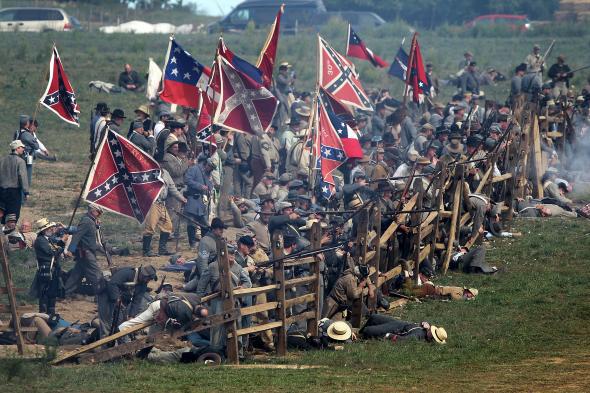This question originally appeared on Quora, the place to gain and share knowledge, empowering people to learn from others and better understand the world. You can follow Quora on Twitter, Facebook, and Google Plus.
Answer by Carter Moore, who consistently wrecked the grading curve in U.S. history classes:
Sure.
I think what’s been lost to history is the fact that the Union was not, in the war’s early years, wholly united around the war effort. The public’s enthusiasm was not helped along by setback after setback against the Confederacy. The Confederacy’s best chances of winning the war were in Lee’s Maryland campaign in 1862, which, if it had been successful, could have resulted in a brokered peace.
So if we use that year as the year the Confederacy prevails (it becomes harder and harder to torture such an outcome from 1863 onward), then we can assume that most of its economic infrastructure would have remained intact (to, yes, include the majority of its slave population), buoyed by international recognition and resumed trade with the U.S. (their factories needed the South’s cotton as much as Europe’s), and it’s not at all unreasonable to imagine the Confederacy continuing on for another generation or two.
Now, how long the Confederacy’s slave-based, agricultural economy could have stayed both slave-based and agricultural and remained viable after that second generation of survival is an open question.
On the one hand, you have to assume that the same economic powerbrokers who so ardently defended the institution of slavery as an essential component of the Southern economy would, by the 1880s, see the writing on the wall that they would need to industrialize or die—whether by witnessing the rise of cotton in India and Egypt, or simply by being awestruck at the economic might of their Northern industrializing neighbors.
Moreover, international pressure might also require that they emancipate or die, with nations souring on trading in slave-produced goods. With those two forces working together, it’s not too far-fetched to imagine the Confederacy’s slave population transitioning from field work to factory work, even if well behind other industrial powerhouses (and if not technically considered slaves, to appease their international trading partners).
On the other hand, you can imagine that a very large portion of the white Southern population would actively resist any attempts to put slaves on an equal footing as them, hamstringing the elites’ attempts to modernize the economy.
In broad strokes, though, there’s nothing inherent about the Confederacy’s segregated economy and society, even with slavery theoretically intact after the war, being incapable of making it to the 20th century. It may not be a glorious entry—one filled with slave uprisings and political upheaval—and it’s not impossible to envision any number of ways it might also ingloriously exit the 20th century. One such scenario could be that the Confederacy, emboldened by its independence and seeking to distract people from its domestic failings, could make the disastrous mistake of attempting to realize far-fetched plans to annex land in Central and South America, overburden its economy, and hasten its demise (especially if it were to decide war with Mexico would be a good idea as part of securing its dominance).
Ultimately, if the U.S. failed to successfully preserve the Union and prevent the Confederacy from achieving international recognition, it’s hard to imagine popular support for waging a second war to annex the Confederacy in the 30 or 40 years after such a defeat; and in the absence of such a campaign, then the Confederacy would be either on a slow road toward economic implosion or a second-tier industrialized economic power by the turn of the 20th century.
If the Confederate States of America had won their independence, would they have survived into the 20th century? originally appeared on Quora. More questions on Quora:
